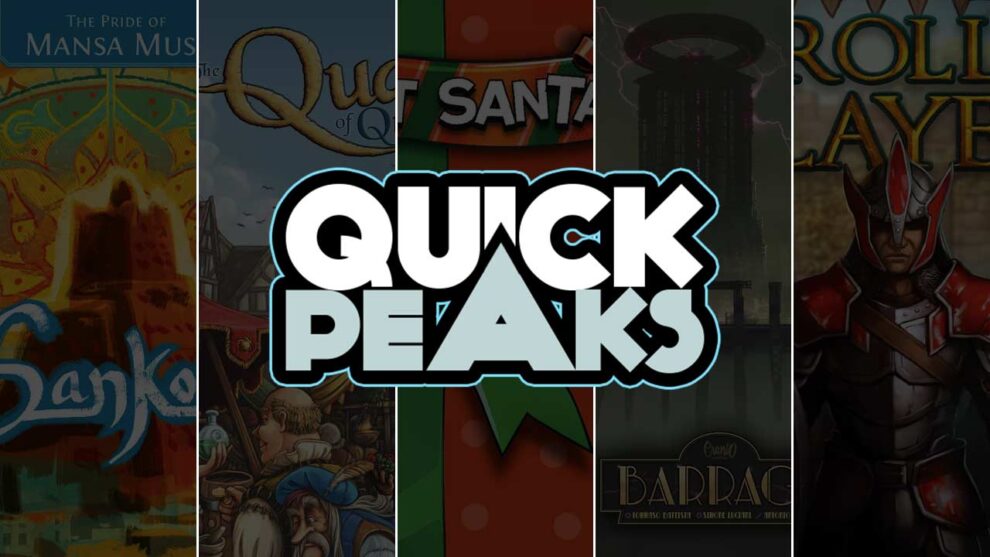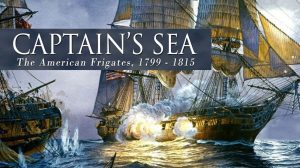Sankoré: The Pride of Mansa Musa – David Wood
When I heard Fabio Lopiano, the designer of Merv: The Heart of the Silk Road, was coming out with a new game with co-designer Mandela Fernández-Grandon, I was instantly interested. While Merv is a medium weight game, Sankoré is on the heavy side. Don’t get me wrong; the mechanics of the game are straight-forward. It’s just that there are lots of moving parts to remember and keep track of. It took me and my gaming group several games to get the hang of it and eliminate mistakes. That aside, Sankoré is a great optimization puzzle.
Players work to generate prestige in 4 academic topics: Astronomy, Law, Theology, and Mathematics. They do so by various means, such as teaching classes, graduating students, completing objective cards, and collecting Sankoré tiles. However, they also need to manipulate the victory point (VP) value of each of the 4 different types of prestige. This is done by placing books in the library. The topic with the most books on a shelf awards 2 VPs per prestige. One VP per prestige is awarded to the topic with the second most books on each shelf. Given there are 3 shelves in the library, 9 total VPs that can be awarded across the 4 types of prestige. Consequently, even if you have lots of prestige in a particular topic, it may not score as many VPs as another. To score well you need to balance gaining prestige with setting books in the library in a way that helps you and not your opponents.
Sankoré comes with good components, including lots of wooden pieces, and top-notch artwork by the incomparable Ian O’Toole. Be advised the game does take up a lot of real estate on your table and takes a bit of time to set up. But in my opinion, that’s a trade-off worth making.
Ease of entry?:
★★★☆☆ – There were a few questions
Would I play it again?:
★★★★★ – Will definitely play it again
Read more articles from David Wood.
Quacks of Quedlinburg – Andy Matthews
We’ve written about The Quacks of Quedlinburg before, and even covered the Herb Witches and Alchemists expansions. I’ve even had a sealed copy sitting on my shelf for close to 2 years. So why am I just now playing it? It’s because I thought the gameplay and interaction would appeal to my two youngest sons—and I sure was right.
In The Quacks of Quedlinburg players are charlatan “doctors” (or quacks), attempting to “craft” potions chock full of ingredients of dubious origins: mandrake root, toxic mushrooms, death’s head moths, and other sorts of things. Each player pulls ingredients from their bag until they either choose to stop or pull too many “cherry bombs” and their cauldron explodes. Depending on how far you make it you’ll earn points, and money which allows you to purchase even more questionable ingredients for future concoctions.
The game plays relatively quickly since most parts of the turn are taken simultaneously. The push your luck aspect is light, and the theme is pretty fun. And my boys really enjoyed the game…maybe your kids will too?
Ease of entry?:
★★★★☆ – The odd bump or two
Would I play it again?:
★★★★☆ – Would like to play it again
Read more articles from Andy Matthews.
Secret Santa – Andrew Lynch
I sat down to play Secret Santa with a few game designers at a game night. After reading the rules, which doesn’t take long, one of the designers responded with disbelief. “That cannot be it,” they said. “There has to be more.”
I’ve had this experience once before, with Mandala, which ended up being a wonderful game. Secret Santa is no Mandala. It’s a set collection game in which, on every turn, players take a card from somewhere else on the table. That’s it. I understand where the decision space is meant to come from: you have a hand of cards which you will never score, which gives you some information about what colors may be of interest to you, but this is not, in my opinion, a very good game.
Ease of entry?:
★★★★★ – No sweat
Would I play it again?:
★☆☆☆☆ – Would play again but will cry about it
Read more articles from Andrew Lynch.
Barrage – Will Hare
Oh my dearie me, Barrage has been on my bucket list for years, and I finally used my birthday as an excuse to force someone with a copy of it to bring it to my house and teach me. The rules should be simple, but how all these systems interact absolutely lit my brain on fire, both in the good way (fun! engaging!) and the bad way (stressful! braindead!). The game is deceptively vicious, as I found out when my entire economy went to shambles, as my opponent built a conduit to siphon water from behind a dam that I was relying on for a big scoring turn. The construction wheel is one of the most excellent implementations of resource management I’ve seen in a worker placement game (or any game, for that matter).
As Andrew sharply pointed out in his review of Barrage, “It makes sense. If I owned a construction company, I wouldn’t have to permanently sacrifice machinery to a project. It would be booked and unavailable until that project is complete.” Analysis paralysis players, beware: this game will consume you. I haven’t stopped thinking about it in the three days since I’ve played it. I’ve watched videos and read forum posts from others discussing strategy. Barrage has burrowed its way into my brain, and I’m confident it will stay there for a long, long time.
Ease of entry?:
★★☆☆☆ – Not an easy onboard
Would I play it again?:
★★★★★ – Will definitely play it again
Read more articles from Will Hare.
Roll Player – K. David Ladage
Unlike Traveller, Dungeons & Dragons has never treated character creation as a game in-and-of itself. This is sad, really, when you consider such third party books as Heroes of Legend, turn the creation of the character’s backstory into one. It is into this void that Roll Player introduces itself to you. At the start, you select a race (player board), a class, a backstory, and an alignment. Each of these is pulling you into certain directions, helping you to guide the creation of this character. Through the rolling of different colored dice, you will slowly determine the attributes (Strength, Dexterity, etc.) and perform actions that will allow you some control over the otherwise random values of these cubes. You can also get treasure, which you can spend in the market to get equipment, skills, and traits. Each of these has the potential to either give you points, or aid you in getting the points you are seeking.
Add in the expansions, and what you have is a wonderful experience! Monsters and Minions adds an adventure of sorts to the mix, as you can forgo the market and go hunting down minions in search of more treasure, honor, and experience… with the possibility of getting wounded along the way. All of this also involves attempting to gather information on how best to fight the monster (the end-of-game big-bad). Fiends and Familiars adds a familiar board which provides you with some more places to put dice as well as an interesting power (this increases the length of the game by three turns). It also adds in fiends that will get attached to your character, restricting what you can do in future turns until you banish the critter from your soul!
Roll Player is a fun and engaging experience! Now… if the game were to result in a fully playable character that could be used in a full-fledged Fantasy RPG, then this would be a 5-star game in my book!
Check out our review of Roll Player.
Ease of entry?:
★★★★☆ – The odd bump or two
Would I play it again?:
★★★★☆ – Would like to play it again














Add Comment